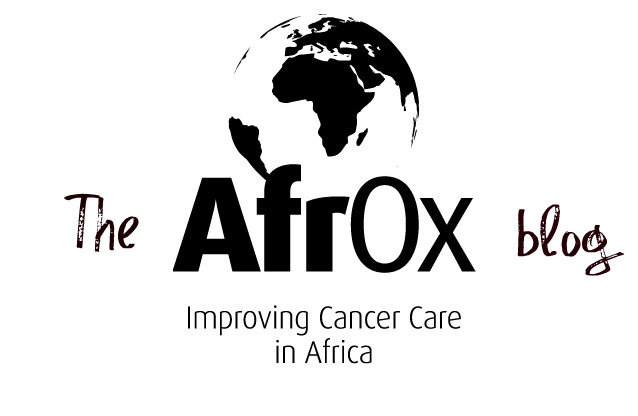One of AfrOx's ongoing aims is to enable twinning programmes between hospitals in the UK and Africa. In November, a team from the Department of Paediatric Haematology and Oncology, Royal Hospital for Sick Children, Edinburgh had their first formal visit to the Childrens’ Cancer Unit at the Korle Bu Teaching Hospital, Accra, Ghana...
The twinning programme
Dr Lorna Renner, a senior paediatric oncologist in Accra, used to work with the team in Edinburgh and has since set up a busy unit to treat childhood cancer in Accra. The idea behind the twinning programme is that the team from Edinburgh provides teaching and training support using all means possible (visits for workshops, email, and if possible videoconferences); while AfrOx provides financial support and coordinates workshops and poster campaigns to raise awareness of childhood cancer throughout the country. It is vital that the content of the teaching and training is decided by the resource-poor country themselves, and not by the resource-rich nation.
The November workshop
The first formal workshop took place between 12-13 November 2010. The programme included talks on brain tumours, Wilms tumour and bone tumours; as well as supportive care, administration of chemotherapy, play specialist techniques and palliative care. The workshop was attended by around 50 doctors, nurses and pharmacists from Korle Bu teaching hospital as well as from the hospital in Kumasi.
On the first day, topics included multidisciplinary team working, introduction to twinning programmes, bone tumours, brain tumours and play therapy techniques including guided imagery. Angela Edgar presented very important information on the setting up of a registry - without this it is impossible to assess improvements in diagnosis and survival rates and reduction in abandonment.
On the second day there were sessions on administration of chemotherapy and supportive care, an interactive play therapy session using patients and some siblings, and talks on Wilms tumour and palliative care. The latter was very much appreciated by all who attended.
Although hard work, the overall feeling of the RHSC team was that the workshop had been a success. The team from Edinburgh are all extremely keen to return to Ghana later in 2011 and to consolidate on what was achieved this time.
The visiting team was made up of Dr Emma Johnson, (Associate Specialist), Dr Angela Edgar, (consultant), Staff Nurse Fiona Bruce, Play Specialist Helen Veitch, and Vanita Sharma from AfrOx.
To find out more about our work, click here.
The twinning programme
Dr Lorna Renner, a senior paediatric oncologist in Accra, used to work with the team in Edinburgh and has since set up a busy unit to treat childhood cancer in Accra. The idea behind the twinning programme is that the team from Edinburgh provides teaching and training support using all means possible (visits for workshops, email, and if possible videoconferences); while AfrOx provides financial support and coordinates workshops and poster campaigns to raise awareness of childhood cancer throughout the country. It is vital that the content of the teaching and training is decided by the resource-poor country themselves, and not by the resource-rich nation.
The November workshop
The first formal workshop took place between 12-13 November 2010. The programme included talks on brain tumours, Wilms tumour and bone tumours; as well as supportive care, administration of chemotherapy, play specialist techniques and palliative care. The workshop was attended by around 50 doctors, nurses and pharmacists from Korle Bu teaching hospital as well as from the hospital in Kumasi.
On the first day, topics included multidisciplinary team working, introduction to twinning programmes, bone tumours, brain tumours and play therapy techniques including guided imagery. Angela Edgar presented very important information on the setting up of a registry - without this it is impossible to assess improvements in diagnosis and survival rates and reduction in abandonment.
On the second day there were sessions on administration of chemotherapy and supportive care, an interactive play therapy session using patients and some siblings, and talks on Wilms tumour and palliative care. The latter was very much appreciated by all who attended.
Although hard work, the overall feeling of the RHSC team was that the workshop had been a success. The team from Edinburgh are all extremely keen to return to Ghana later in 2011 and to consolidate on what was achieved this time.
The visiting team was made up of Dr Emma Johnson, (Associate Specialist), Dr Angela Edgar, (consultant), Staff Nurse Fiona Bruce, Play Specialist Helen Veitch, and Vanita Sharma from AfrOx.
To find out more about our work, click here.

